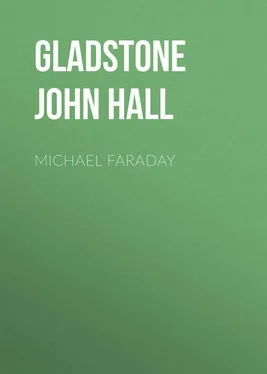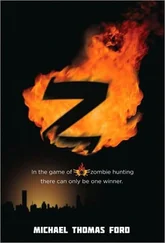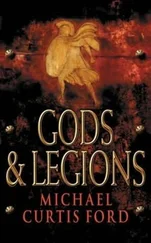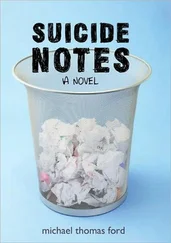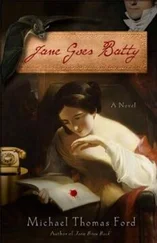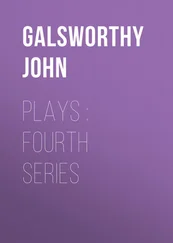John Gladstone - Michael Faraday
Здесь есть возможность читать онлайн «John Gladstone - Michael Faraday» — ознакомительный отрывок электронной книги совершенно бесплатно, а после прочтения отрывка купить полную версию. В некоторых случаях можно слушать аудио, скачать через торрент в формате fb2 и присутствует краткое содержание. Жанр: foreign_antique, foreign_prose, на английском языке. Описание произведения, (предисловие) а так же отзывы посетителей доступны на портале библиотеки ЛибКат.
- Название:Michael Faraday
- Автор:
- Жанр:
- Год:неизвестен
- ISBN:нет данных
- Рейтинг книги:5 / 5. Голосов: 1
-
Избранное:Добавить в избранное
- Отзывы:
-
Ваша оценка:
- 100
- 1
- 2
- 3
- 4
- 5
Michael Faraday: краткое содержание, описание и аннотация
Предлагаем к чтению аннотацию, описание, краткое содержание или предисловие (зависит от того, что написал сам автор книги «Michael Faraday»). Если вы не нашли необходимую информацию о книге — напишите в комментариях, мы постараемся отыскать её.
Michael Faraday — читать онлайн ознакомительный отрывок
Ниже представлен текст книги, разбитый по страницам. Система сохранения места последней прочитанной страницы, позволяет с удобством читать онлайн бесплатно книгу «Michael Faraday», без необходимости каждый раз заново искать на чём Вы остановились. Поставьте закладку, и сможете в любой момент перейти на страницу, на которой закончили чтение.
Интервал:
Закладка:
J. H. Gladstone
Michael Faraday / Third Edition, with Portrait
PREFACE
Shortly after the death of Michael Faraday, Professor Auguste de la Rive, and others of his friends, gave to the world their impressions of his life, his character, and his work; Professor Tyndall drew his portrait as a man of science; and after a while Dr. Bence Jones published his biography in two octavo volumes, with copious extracts from his journals and correspondence. In a review of this "Life and Letters" I happened to mention my thought of giving to the public some day my own reminiscences of the great philosopher; several friends urged me to do so, not in the pages of a magazine, but in the form of a little book designed for those of his fellow-countrymen who venerate his noble character without being able to follow his scientific researches. I accepted the task. Professor Tyndall and Dr. Bence Jones, with Messrs. Longman, the publishers, kindly permitted me to make free use of their materials; but I am indebted to the Corporation of the Trinity House, and to many friends, for a good deal of additional information; and in compiling my book I have preferred, where practicable, to illustrate the character of Faraday by documents or incidents hitherto unpublished, or contained in those sketches of the philosopher which are less generally known.
It is due to myself to say that I had pretty well sketched out the second part of this book before I read M. Dumas' "Eloge Historique." The close similarity of my analysis of Professor Faraday's character with that of the illustrious French chemist may perhaps be accepted as an additional warrant for the correctness of our independent estimates.
PREFACE TO SECOND EDITION
The very favourable reception which my book has met with, both from the press and the public, seems to call for my grateful acknowledgment on the issue of a second edition.
In revising the former, I have added some further particulars about Faraday, especially in regard to "his method of working;" and an engraving from a photograph by Watkins, which best recalls to my recollection the features and the usual expression of the genial philosopher.
SECTION I
THE STORY OF HIS LIFE
At the beginning of this century, in the neighbourhood of Manchester Square, London, there was an inquisitive boy running about, playing at marbles, and minding his baby-sister. He lived in Jacob's Well Mews, close by, and was learning the three R's at a common day-school. Few passers-by would have noticed him, and none certainly would have imagined that this boy, as he grew up, was to achieve the truest success in life, and to die honoured by the great, the wise, and the good. Yet so it was; and to tell the story of his life, to trace the sources of this success, and to depict some of the noble results of his work, are the objects of this biographical sketch.
It was not at Jacob's Well Mews, but in Newington Butts, that the boy had been born, on September 22, 1791, and his parents, James and Margaret Faraday, had given this, their third child, the unusual name of Michael. The father was a journeyman blacksmith, a skilful workman who, in spite of poverty and feeble health, strove to bring up his children in habits of industry and the love of God.
Of course young Michael must soon do something for his living. There happened to be a bookseller's shop in Blandford Street, a few doors from the entrance to the Mews, kept by a Mr. Riebau, an intelligent man, who is said to have had a leaning to astrology; and there he went as errand boy when thirteen years old. Many a weary walk he had, carrying round newspapers to his master's customers; but he did his work faithfully; and so, after a twelvemonth, the bookseller was willing to take him as an apprentice, and that without a premium.
Now, a boy in a bookseller's shop can look at the inside as well as the outside of the books he handles, and young Faraday took advantage of his position, and fed on such intellectual food as Watts's "Improvement of the Mind," Mrs. Marcet's "Conversations on Chemistry," and the article on "Electricity" in the Encyclopædia Britannica , besides such lighter dishes as Miss Burney's "Evelina;" nor can we doubt that when he was binding Lyons' "Experiments on Electricity," and Boyle's "Notes about the Producibleness of Chymicall Principles," he looked beyond the covers. 1 1 These books, with others bound by Faraday, are preserved in a special cabinet at the Royal Institution, together with more valuable documents, – the laboratory notes of Davy and those of Faraday, his notes of Tatum's and Davy's lectures, copies of his published papers with annotations and indices, notes for lectures and Friday evening discourses, account books, and various memoranda, together with letters from Wollaston, Young, Herschel, Whewell, Mitscherlich, and many others of his fellow-workers in science. These were the gift of his widow, in accordance with his own desire.
And his thirst for knowledge did not stop with reading: he must see whether Mrs. Marcet's statements were correct, and so, to quote his own words, "I made such simple experiments in chemistry as could be defrayed in their expense by a few pence per week, and also constructed an electrical machine, first with a glass phial, and afterwards with a real cylinder, as well as other electrical apparatus of a corresponding kind."
He kept too a note-book called "The Philosophical Miscellany," intended, he tells us, "to promote both amusement and instruction, and also to corroborate or invalidate those theories which are continually starting into the world of science;" and miscellaneous indeed were the scraps he gathered from the magazines of the time.
One day, early in 1810, walking somewhere in the neighbourhood of Fleet Street, he saw in a shop-window a bill announcing that lectures on natural philosophy were delivered by Mr. Tatum, at 53, Dorset Street, at eight in the evening, price of admission one shilling. He wanted to hear these lectures. His master's permission was obtained, but where was the money to come from? The needful shillings were given him by his elder brother, Robert, who earned them as a blacksmith; and so Michael Faraday made his first acquaintance with scientific lectures. And not with lectures only, for Tatum's house was frequented by other earnest students, and lifelong friendships were formed. Among these students was Benjamin Abbott, a young Quaker, who had received a good education, and had then a situation in a City house as confidential clerk. With him Faraday chatted on philosophy or anything else, and happily for us he chatted on paper, in letters of that fulness and length which the penny post and the telegraph have well-nigh driven out of existence; and happily for us, too, Abbott kept those letters, and Dr. Bence Jones has published them. They are wonderful letters for a poor bookseller's apprentice; they bear the stamp of an innate gentleman and philosopher.
Long afterwards, when Benjamin Abbott was an old man, he used to tell how Faraday made his first experiments in the kitchen of his house, and delivered his first lecture from the end of that kitchen table. The electrical machine made by him in those early days came into the possession of Sir James South, and now forms one of the treasures of the Royal Institution.
As the eager student drank in the lectures of Tatum, he took notes, and he afterwards wrote them out carefully in a clear hand, numbering and describing the different experiments that he saw performed, and making wonderfully neat drawings of the apparatus, in good perspective. These notes he bound in four volumes, adding to each a copious index, and prefixing to the first this dedication to his master: —
"Sir,
Читать дальшеИнтервал:
Закладка:
Похожие книги на «Michael Faraday»
Представляем Вашему вниманию похожие книги на «Michael Faraday» списком для выбора. Мы отобрали схожую по названию и смыслу литературу в надежде предоставить читателям больше вариантов отыскать новые, интересные, ещё непрочитанные произведения.
Обсуждение, отзывы о книге «Michael Faraday» и просто собственные мнения читателей. Оставьте ваши комментарии, напишите, что Вы думаете о произведении, его смысле или главных героях. Укажите что конкретно понравилось, а что нет, и почему Вы так считаете.
